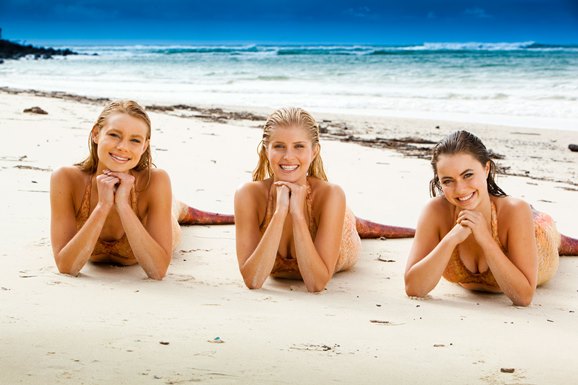‘Mako Mermaids’.
Calls by the Seven, Nine and Ten networks to scrap the quotas for children’s and pre-school programming have been roundly condemned by key screen industry groups and guilds.
“What the broadcasters are essentially arguing for is a reward for failure: failing Australian children, failing Australian parents, failing Australian industry,” Australian Directors Guild CEO Kingston Anderson said today.
“It is a cruel irony that in an inquiry into the growth and sustainability of the Australian film and television industry, the commercial broadcasters have argued for the destruction of the Australian children’s content industry.”
The broadcasters told the House of Representatives Standing Committee on Communications and the Arts in Sydney yesterday the quotas are outdated, unduly restrictive and no longer serve the audience.
“It is neither sustainable nor defensible for commercial broadcasters to be required to spend millions of dollars a year on programs that are watched by only a few thousand child viewers,” Seven West Media CEO Tim Worner told the committee, which is holding an inquiry into factors contributing to the growth and sustainability of Australia’s film and television industry.
Ten CEO Paul Anderson pointed out kids are watching the ABC’s dedicated children’s channels and iview, pay TV kids channels, Netflix Kids and YouTube, with the result that Ten’s shows are usually watched by around 2,000 5-12-year-olds.
“With children not watching these programs, and advertising dollars not available to fund them, this content should be the remit of the national broadcasters ABC and SBS,” Anderson said.
Screen Producers Australia CEO Matt Deaner responded today: “There has been a selective use of figures. The primary broadcaster audience reflects where the children’s content has been programmed, usually on multi-channels. But we know that the numbers increase across platforms. This is why we need a multiplicity of children’s content offerings, not a monopoly. It takes a village to raise a child and that village is multi-platform.”
According to Screen Australia’s Drama Report, in 2014-15 there were 47 children’s productions in Australia with a total spend of $299 million. However in that year the ACMA reported that the commercial broadcasters spent approximately $30 million on children’s content out of a total content budget of nearly $2 billion.
“This is about more than money. It’s about who we are as Australians. An intrinsic value of Australian children’s drama is that it reflects the diversity of the Australian experience back to our children,” said Australian Writers Guild president Jan Sardi.
“If we lose the children’s industry, we will lose a sense of self, our cultural heritage. The next generation will grow up on a diet of foreign programming and without Australian accents.”
Australian Guild of Screen Composers president Guy Gross said, “Australian tax payers want and deserve Blinky Bill and the myriad of wonderful Australian characters that only a quota protects. Otherwise we become a dumping ground for exclusively American culture.”
Paul Murphy, CEO of the Media, Entertainment and Arts Alliance, cited a recent study by PwC which concluded that the removal of content requirements in Australia would result in a 100 per cent reduction in children’s drama and other children’s content production.
“Under no circumstances can we take the risk of removing existing children’s content quotas unless a water tight alternative is in place,” Murphy said.
Australian Children’s Television Foundation CEO Jenny Buckland today accused the broadcasters of undermining the quotas.
“The commercial broadcasters have spent 30 years trying to make the kids quotas fail,” she told IF.
“In spite of their best efforts, shows like Round The Twist, Ocean Girl, Lockie Leonard and Mako Mermaids have triumphed all around the world and stand up to repeat viewing.
“Before Government changes the way the quotas work at the behest of the commercial broadcasters who have treated this treasured and iconic programming so shabbily, I am sure they would want to work out the best way to support it going forward.
“That must involve enshrining the role of the ABC in supporting much higher levels of Australian children’s content than it does now and working out how to get Australian kids content on commercial platforms.”
Buckland concluded with a swipe at the Nine Network, which has launched the Kids Go app, claiming, “It just wants to dish them up cheap cartoons with no Australian content.”


